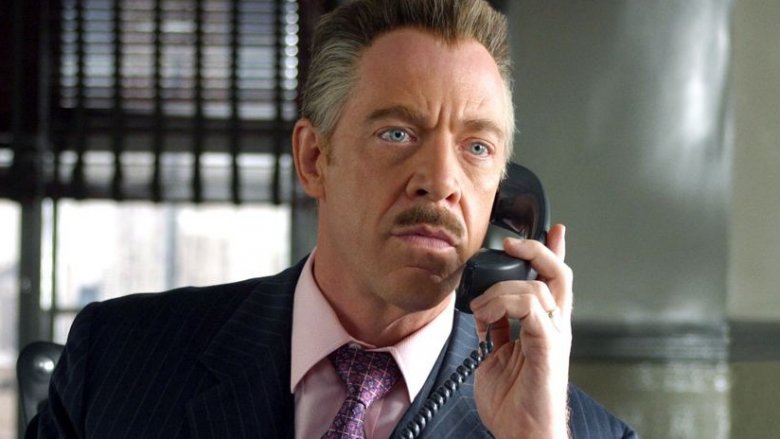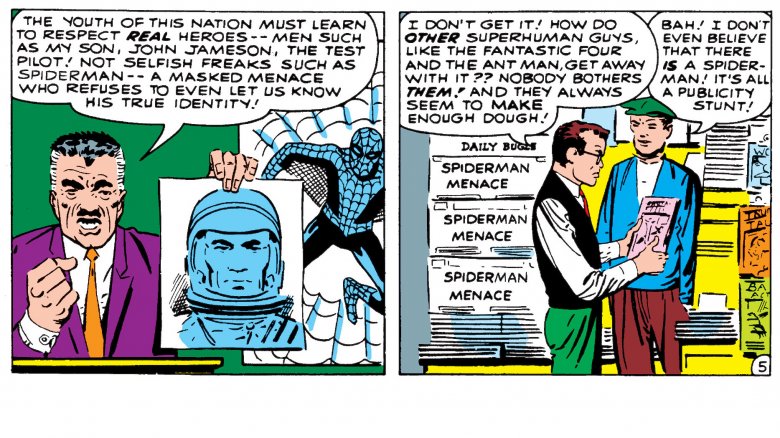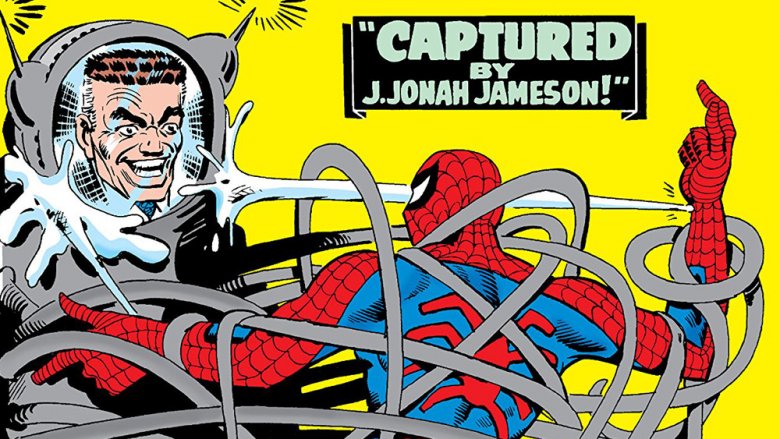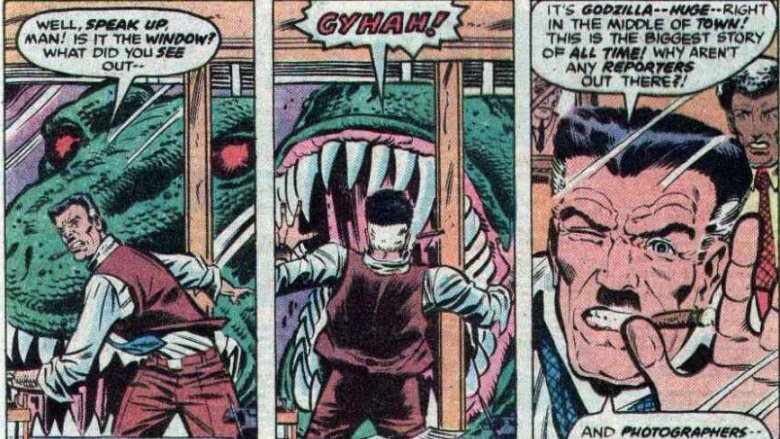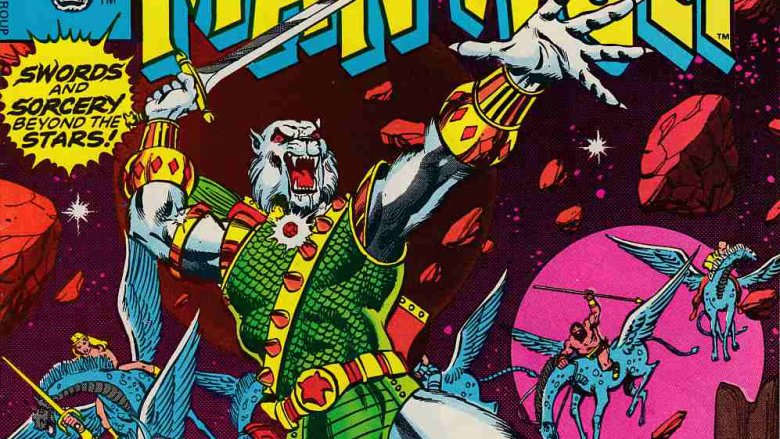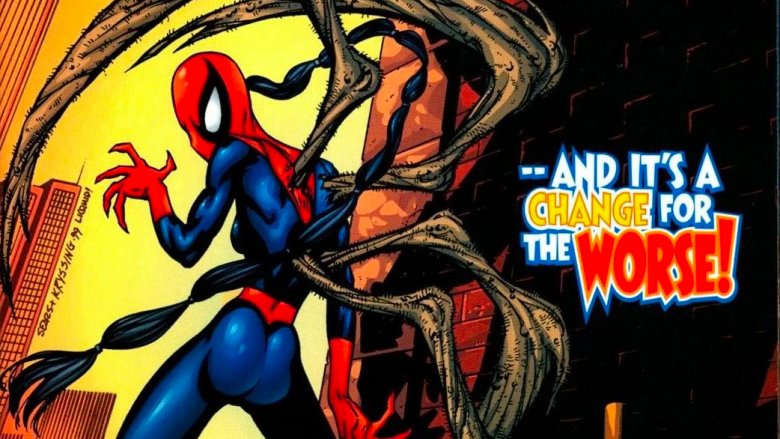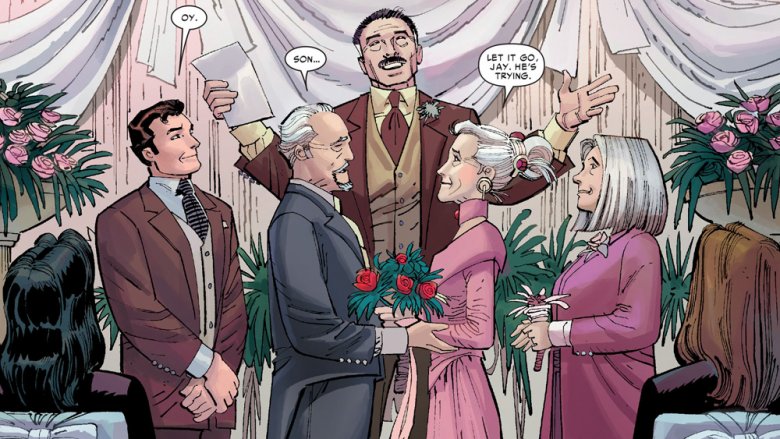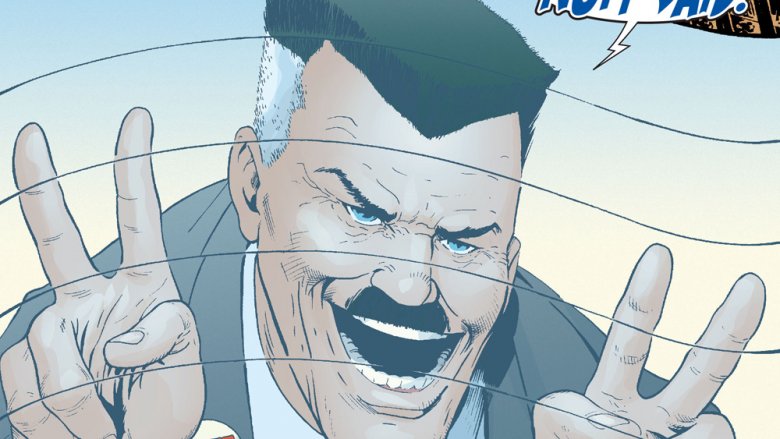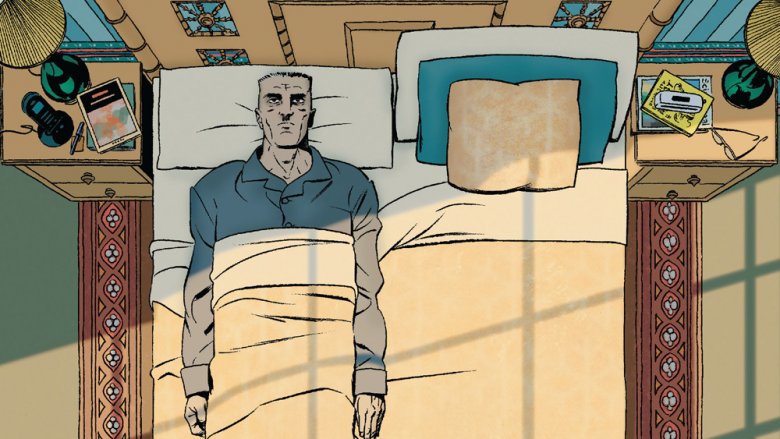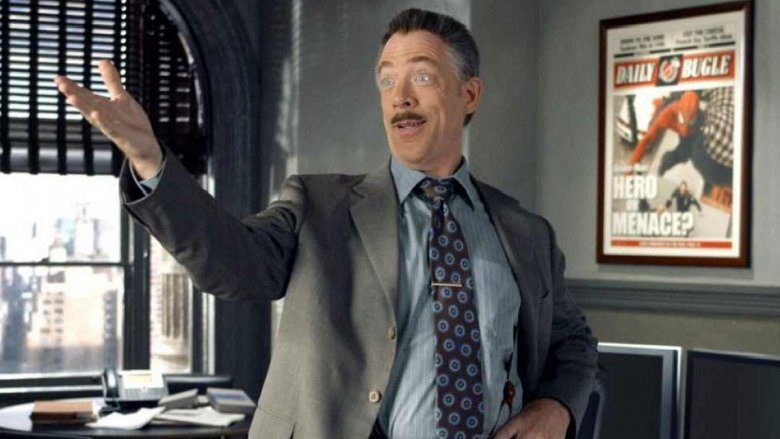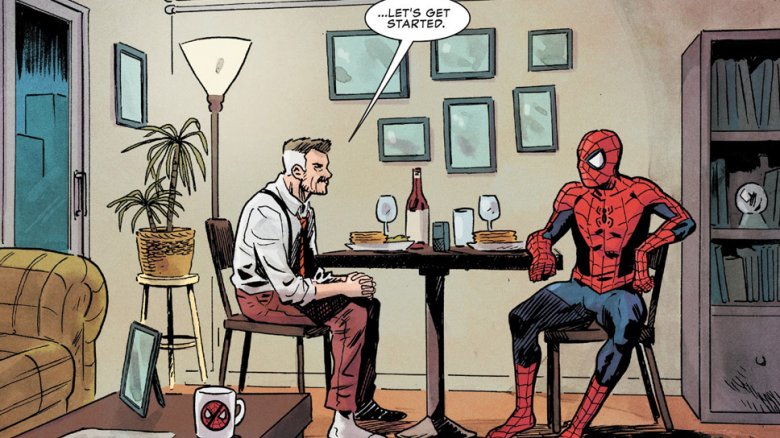The Untold Truth Of J. Jonah Jameson
When you get right down to it, every single comic book, movie, and cartoon about Marvel's web-slinging flagship hero is just a series of pictures — pictures of Spider-Man! And there's no one who knows more about pictures of Spider-Man than the guy who's published them in his newspaper for the past five decades. That's right. We're talking about J. Jonah Jameson.
He's arguably the best character in the best supporting cast that's ever existed in comics, but Jonah is way more complicated than a simple crusading editor with some angry ideas about masked vigilantes, and that's to be expected. After all, he's been around nearly as long as Spider-Man himself, and he's served in nearly every role, from antagonist to full-on sidekick. From his introduction as the father of a hero astronaut werewolf to the shocking discovery that changed his life, here's the untold truth about the Daily Bugle's blowhard publisher, J. Jonah Jameson.
He's been menacing since day one
Like Spider-Man himself, J. Jonah Jameson was created by Stan Lee and Steve Ditko, and he made his first appearance in the very first issue of Amazing Spider-Man back in 1963, making him one of the oldest members of Spidey's supporting cast. In fact, the only ones that show up before Jonah are Aunt May, Uncle Ben, Flash Thompson, and Liz Allan — all of whom made their debuts in Amazing Fantasy #15 — and it's fair to say that from Jonah's very first page, he's got more personality than the four of them put together.
For a lot of characters, those early appearances function as a sort of prototype for what the character would eventually become. Superman and Batman, for instance, evolved into very different heroes than they were in their Golden Age debuts, and while Lee and Ditko pretty much nailed it when they created Spider-Man, even he had to deal with Lee mistakenly calling him "Peter Palmer" and "Super-Man" in those early issues. Jonah, on the other hand, has been the J. Jonah Jameson we know and love (or at least tolerate) since day one.
In a lot of ways, his appearance in Amazing Spider-Man #1 laid out a blueprint for how J.J.J. would work for the next six decades. Not counting the splash page where he was already yelling, he first appeared hunched over a typewriter, banging out an editorial to run Spidey out of town. He then announced that rather than a masked vigilante who could inspire children to hurt themselves by imitating his "fantastic feats," everyone should be paying attention to his son, hero astronaut John Jameson.
But when something went wrong with John's test flight and Spider-Man risked his own life to save Jonah's son, he was grateful for about 12 seconds before insisting that Spidey was the one responsible for the whole thing and offering a reward for his capture. And, well, that's Jonah. Everything you need to know about him is right there in 13 pages, setting up an endless amount of drama for Peter Parker's life.
The Spider-Slayers and the Scorpion
A month after his first appearance, J. Jonah Jameson cemented himself as a fixture of both Spider-Man and Peter Parker's life when he put out the call for photos of Manhattan's latest supervillain, the Vulture. Soon after, he was calling for pictures of Spider-Man. See, whether Jonah liked it or not, it turned out that pictures of the wall-crawler sold a lot of newspapers in the Marvel Universe, and freelance photography became Peter's most enduring career.
Jonah wasn't just the blustering boss of the Daily Bugle (initially called NOW magazine), though. He might not have the murderous track record of the Green Goblin or Doctor Octopus, but it's pretty easy to argue that he was Spider-Man's greatest antagonist for most of the '60s and '70s, gleefully turning public opinion against the crimefighter, which in turn isolated him from the more publicly adored heroes like the Avengers and the Fantastic Four.
It wasn't just the bad press, though. Jonah's hatred of Spidey, combined with the money that was rolling in from unwittingly publishing Spider-Man's selfies, gave him the ability to pursue a more direct course of action against the hero. In Amazing Spider-Man #25, he funded the creation of deadly robots called the Spider-Slayers, which, well, you can probably figure out what they were meant to do. The first one even had a camera and TV screen mounted on it so that Jonah could Skype in to an attempted murder and/or unmasking.
Six months before that, though, he paid for a private investigator named Mac Gargan to be "enhanced" into a cybernetic supervillain called the Scorpion. He'd go on to become one of Spider-Man's deadliest foes, even spending a few years as the host of the Venom symbiote, straight-up eating people and haunting Jonah for years to come.
J. Jonah Jameson and the king of the monsters
Jonah might be an angry, bitter, hateful, reactionary blowhard jerk with dubious taste in facial hair, but it's important to remember that he has a few good qualities, too. While it doesn't always come through in his actions, he really does care about getting to the truth, and he's used his paper to stand against organized crime. He's also been an outspoken proponent of both realistic civil rights and their corresponding Marvel Universe metaphor, mutant equality. Aside from Spider-Man, the Bugle is usually characterized as having a reliable, if somewhat sensationalized, view of the Marvel Universe.
Most importantly, though, Jonah has always been depicted as being downright fearless. Most of the time, this is brought up in the context of his journalistic career, showing Jonah as someone who's willing to face all kinds of danger to get a story or to protect his employees. That scene in Sam Raimi's Spider-Man movie where he refuses to hand Peter Parker over to the Green Goblin, even as he's being threatened with death by explosive pumpkin bomb, is a great example and very true to his character in the comics. There is, however, a way more ludicrous example of bravery that even Daredevil, the Man Without Fear, would think was going a little too far.
Back in the '70s, Marvel briefly published a Godzilla comic that was, well, every bit as buck wild as you'd want a story about Godzilla rampaging through the Marvel Universe to be. In the book's penultimate issue, Godzilla #23, Godzilla finally makes it to Manhattan, battling the combined forces of S.H.I.E.L.D., the Fantastic Four, and the Avengers. Even Godzilla, however, has to take a pause when he finds himself eye to eye with the top floor offices of the Daily Bugle building, with the paper's typically furious editor leaning out the window to yell, "Watch it, you overgrown lizard — you're messing with J. Jonah Jameson here!" Seriously, the guy's gone eye to eye with Godzilla. You think the Marvel Universe has anything else that could scare him?
His son, the astronaut-werewolf-space god
J. Jonah Jameson's debut in Amazing Spider-Man #1 came alongside another long-running Marvel mainstay — his son, his pride and joy, hero astronaut John Jameson. This was the first time that the comics would dive into J. Jonah Jameson's complicated family tree, but it wouldn't be the last by a long shot.
John is a pretty fascinating character in his own right, though. In that first story, he serves as a sort of counterpoint to Spider-Man. He's the traditional military hero of the space race, whose smiling mug is plastered on the front of newspapers, contrasted with the mysterious, super-powered, broke vigilante teenager who skitters around on walls and beats up old men with jetpacks. For his part, though, John was way more chill than his dad, and he recognized Spider-Man for the hero that he was. He'd go on to have a long career, serving as both an astronaut who was sent to the moon and as Captain America's personal pilot.
Oh, and he's also an interdimensional werewolf space god.
That trip to the moon involved John finding a magic jewel that turned him into the Man-Wolf, a werewolf in a sleeveless, lime green romper. This, in turn, brought him into some conflict with Michael Morbius, the Living Vampire, largely because both characters were weird sci-fi ways of recreating famous monsters in order to get around the Comics Code's rules about the supernatural.
Later, he went back to the moon and discovered that his werewolf form was actually the current incarnation of Stargod, the divine ruler of the D&D-esque dimension of Other-Realm. John would remain an occasional werewolf and even more occasional space messiah, most notably when he went to space to get over the end of his marriage to She-Hulk, which turned out to have been caused by another space god. Marvel Comics are weird, folks.
The other, other Spider-Woman
While he's the one with the longest tenure and the most impressive résumé, John Jameson isn't Jonah's only kid. J.J.J. is also the adoptive father of Martha "Mattie" Franklin, a character who might just be even weirder than her brother, the space werewolf. Why? Well, it all started when she was 15 and was used as a human sacrifice the first time (more on that in a second) in a magic ritual where the Green Goblin tried to get wizard powers.
It was called "the Gathering of Five," in which a handful of rich jerks, Norman Osborn included, dressed up in cultist robes and played a mystical version of Russian roulette, where each one would be granted either immortality, insanity, knowledge, power, or death. Norman Osborn, a guy who was already pretty well known for putting on a LARP costume and throwing women off bridges, got "insanity," which seems like overkill. Mattie got "power," in the form of the standard issue superhero set: strength, toughness, flight, agility, and so on. Since her father died in the lead-up to the gathering, her uncle Jonah adopted her. Despite his influence, she was a big fan of Spider-Man, and used her powers to fill in for him while Peter Parker was indisposed, and she eventually became the third Spider-Woman.
She also lost her powers, then re-absorbed her powers and someone else's powers, which gave her psychic constructs of spider legs that popped out of her back and shot mind bullets at people. Then, after not being seen for a while, she showed up in the mature readers Alias title — the book that introduced Jessica Jones — where an extremely bad boyfriend got her hooked on drugs and then harvested her genetic material to make a super-drug called Mutant Growth Hormone (despite Mattie not being a mutant). Then she joined a support group for former teen superheroes. Then, she was used as a human sacrifice for the second time by Kraven the Hunter's wife in order to bring her son back to life. This time, the sacrifice stuck, and Mattie was dead. For now. Sure, werewolves are weird, but at least we've got a few hundred years of stories to get used to them. Magic wizard spells, psychic spider legs, and drugs made of mutant blood? That stuff's only in comics.
The truth about J. Jonah Jameson's dad
There's one more notable member of the Jameson family who had a big impact on both his and Spider-Man's lives: J. Jonah Jameson Sr.
That's right. In 2009, Mark Waid and Marcos Martin introduced Jonah's previously estranged father, who thankfully went by "Jay" in order to keep things from being ridiculously confusing. While his relationship with Jonah was rocky at best, his return to his life paved the way for their relationship to be patched up. Perhaps more importantly, it also allowed Jay to find love in a pretty unlikely place when he eventually married Peter Parker's beloved Aunt May, making Spider-Man and J. Jonah Jameson brothers-in-law. This, incidentally, made him May's second husband after Ben Parker (Doc Ock's attempt at wifing Aunt May in order to get access to her inherited uranium mine never actually happened).
Sadly, Jay died not long after the wedding, passing away from natural causes, but his relationship with May and his death are secondary compared to his real contribution. With his arrival, we learned that he was John Jonah Jameson Sr., making the space werewolf John Jonah Jameson III. Between them is our beloved J. Jonah Jameson Jr., meaning that all this time, Triple-J had secretly been Quadruple-J.
Mayor Jonah
J. Jonah Jameson is most commonly known as the publisher of the Daily Bugle, but that's not the only job he's ever had. When an enterprising capitalist named Dexter Bennett bought the paper, rebranded as The DB!, and pivoted to video to lure in a hip young audience, Jonah left journalism and went into a career that was even more suited to his tendency to angrily shout sensationalized, ill-informed screeds about the kinds of people he didn't like: politics!
In 2010, Jonah was elected mayor of New York City, and as you might expect, his first act was to devote a good portion of the NYPD's budget and manpower to arresting Spider-Man. Unfortunately for him, the plan backfired. After attempting to strike a truce, Spidey instead went into overdrive, winning over New Yorkers both through his traditional crime-fighting and through stuff like webbing up a guy's mouth when he was loudly yelling into his phone on the subway.
Eventually, Jonah warmed to Spider-Man (who was actually Doctor Octopus, having taken over Peter Parker's body), only to be blackmailed into handing over control of the Raft, NYC's supervillain prison, to the disguised supervillain. That wound up leading to a scandal that saw him retiring from politics to take a job as a pundit on the right-wing Fact Channel, leaving New Yorkers looking for a new mayor who wouldn't be so mired in corruption and scandal. That didn't quite go their way, though, as the next mayor of Marvel's New York City was Wilson Fisk, the Kingpin of Crime. You know, the guy who tries to kill Daredevil on a weekly basis? Yeah, him. Good luck with all that, New York!
J. Jonah Jameson's quiet tragedy
With his over-the-top anger and blowhard personality, Jonah is usually played for laughs. That makes it all the more affecting when he winds up dealing with personal tragedy.
In 2011, Jonah had to deal with one of his many past sins coming back to haunt him. In this case, it came in the form of Alistair Smythe, the cyborg murderer whose father, Spencer Smythe, had created the original Spider-Slayers for Jonah back in the '60s. He blamed Jonah for his father's death, so he targeted him and his family for death more than a few times over the years. In Amazing Spider-Man #654, he got his revenge, killing Jonah's wife, Marla, when she sacrificed herself to save her husband.
Her last words to Jonah were a plea, "Don't waste any more of your life on hate," and in a reversal of his usual tactics, he didn't blame Spider-Man for failing to stop Smythe, instead blaming himself. The issue that came after, by Dan Slott and Marcos Martin, devoted its first eight pages to Marla's funeral, a sequence that was completely free of dialogue or sound effects. The opening image of Jonah, laying awake in bed, sleeping next to the empty half that used to be Marla's as the alarm goes off on her nightstand, with her glasses right where she left him, is one of the single best pages in J.J.J.'s long history in comics. The silence, and its contrast to the yelling, desk-pounding image of Jonah that readers expected, was deeply affecting.
J. (K. Simmons) Jonah Jameson
Superhero movies have had some pretty incredible casting over the last two decades. It's tough to imagine anyone stepping into the role of Captain America after Chris Evans, for instance, and as early as 1998, Wesley Snipes pretty much redefined who Blade was on and off the page. In the entire history of the genre, however, there's no bit of casting that has ever been as perfect as when Sam Raimi's 2002 Spider-Man film gave us J.K. Simmons as J. Jonah Jameson.
With his flat-top haircut, mustache, and cigar-chomping sneer, Simmons looked like he'd just stepped out of the comic book page and into real life — and to be fair, so did the rest of the Daily Bugle staff, particularly Elizabeth Banks as an underrated, studiously comics-accurate Betty Brant. It was the way he delivered his dialogue, though — an angry, gravelly patter that was fired at the Bugle staff like a machine gun — that made him embody the character. Also, say what you will about Spider-Man 3, but the sequence of Jonah attempting to avoid losing his temper as Betty delights in enforcing his wife's edicts about his blood pressure is a pure delight.
Simmons embodied the role so well that when the Spider-Man film franchise was rebooted (again) for Homecoming, plenty of fans wondered how Marvel Studios could possibly replace him. The answer? They didn't. At the end of Spider-Man: Far From Home, a surprise cameo brought Simmons back as Jonah, delivering that same note-perfect characterization with a slight tweak as an Alex Jones-like conspiracy theorist. It turns out that Spider-Man himself can be replaced, but Simmons is forever.
The interview of a lifetime
In 2017, Chip Zdarsky and Michael Walsh dropped a huge change for Jonah (and Spider-Man) in the pages of Peter Parker: The Spectacular Spider-Man #6. The setup was that Jonah had provided Spidey with some information that he needed in exchange for the promise of an exclusive, no-holds-barred interview, held over a lasagna dinner at Jonah's apartment.
Over the course of the interview, the issue dove into the relationship between the characters and their views of each other with a focus that had never really been done before. As the two characters built to a massive argument, Jonah revealed that his problem with Spider-Man came down to the fact that he cracked jokes while everyone else had to deal with the tragedy that followed him, hiding behind his mask so that he never had to deal with the — wait for it — responsibility for the consequences of his actions.
Finally, both characters hit their breaking point, and Spider-Man wound up explaining himself in the only way he could: He revealed his identity. Confronted with the fact that his arch-nemesis was Peter Parker, a guy that Jameson had grown close to over the years and even thought of as something close to a second son, Jonah wasn't angry, as you might expect. Instead, he made an honest attempt to change his ways, trying to "help" Peter now that he understood his motivations, and, of course, winding up causing just as much trouble as when he was actively antagonistic.
